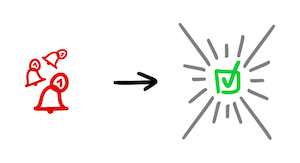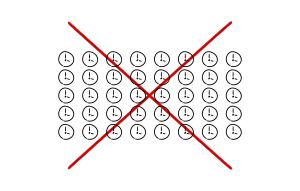How to use the Internet in a healthy way

Over the last few months, I dove really deep into the topic of addiction and compulsive use of the Internet.
I feel my relationship with the Internet is much healthier now because of it and I wanted to share with you what it looks like in practice when you apply these rules.
I wake up with an alarm clock on my phone at 6 am. No snoozing.
In the past, I used an analog alarm clock to decrease the probability of wasting time in the morning by checking my phone or snoozing. Actually, when I woke up, I didn’t see my phone at all. It was hidden in a drawer. I no longer need this because I have nothing interesting on my phone and it saves me the hassle of using another device.
I have only one morning ritual: after I wake up, I go watch the sun for a few minutes - this helps my body wake up. Then I do my morning routine. After this, I start working on the most important thing of the day. Today, it’s writing. To do that, I have to use my laptop, so I intentionally open it for the first time.
After 90 minutes or so, I take a break and go make tea. While making the tea, I’m just thinking, not doing anything else. I’m enjoying my input-free time.
While sipping my favorite tea, I start another 90-minute session. While working the whole time, I have a piece of paper and a pen next to me, ready to write down any things I have to do, or any potentially distracting ideas (“Did I message John back? Buy Fish Oil...”)
After 90 minutes, I once again take a short break - stand up, do a little bit of stretching, breathe for a while.
Then I work for another hour on whatever is necessary.
By now, it’s after 11 a.m. and it’s the first time I open my email, then I open messages on my phone. If I have the time, I process some of the things I wrote down.
All my friends know that I don’t respond to messages in the morning because I don’t have notifications on but I’m available to call if it’s urgent. I found out that this setup strikes a delicate balance between not being always on but being accessible easily. Most days, no one calls me in the morning but I can trust the system that I will hear if someone calls me and I don’t have to look at my phone at all.
After a call with Vita at 11:30, I break my fast. While cooking and then eating I try to be as mindful as possible.
After eating, depending on the work, I try to dive into another session of work. If I’m tired, I read for a while. After this session, depending on the energy, I do some form of exercise or take a nap.
While working out, I don’t listen to anything, I try to focus on the sets, running, or whatever I’m doing. If there are friends, I casually converse with them during the rest periods.
Late afternoons and evenings differ wildly:
Generally, after I come home, I have to eat.
While cooking, I call friends, or I sometimes listen to a podcast or music.
Other days, I go out and have dinner with friends.
I like to go for long walks with friends, play board games, or go to the cinema.
Sometimes I just stay at home and read to further my research.
If I feel like it, I have another work session, or I process things I wrote down throughout the day on the piece of paper, but most days, I go out to meet other people. When I meet others, I sometimes leave my phone at home. When I know I need it (for Uber or to actually meet them), I treat my phone like it’s a book. I focus on being present in the conversation.
Around 10 p.m. I go to bed and listen to an audiobook. Or sometimes I go straight to bed while falling asleep with my own thoughts and dreaming about the future.
If I stay up late, I don’t worry about it… but generally by midnight, I want to be sleeping because 6 hours of sleep once in a while are totally fine.
On Saturday afternoon, I’m allowed to consume content aggregators. I catch up on news, or get updated on social media.
Sunday is my maintenance day. I usually go through all the things I wrote down and haven’t resolved throughout the week.
Depending on the mood, I call friends, listen to music, audiobooks, or podcasts while doing groceries, cleaning, and meal prepping for the week ahead. Sometimes, I just focus on doing the things, it’s like meditation.
---
That’s it. This is what my week looks like. As you can see, there’s no binge-watching, no gaming, almost no social media. It didn’t use to be that way. I used to indulge a lot and felt bad as a result. I found this way of living much more satisfying, after a brief period of adjustment.
For now, I would rather move my life forward by being bored in the evening and finally doing something I’ve been postponing for a while… When we have access to high dopamine low effort entertainment (video games, drugs, porn, Netflix), it becomes the default way to spend leisure time really quickly. I don’t think this is sustainable forever but for now, it’s a phase, and all the tv shows, games, and entertainment aren’t going anywhere.
You might say it’s too strict. Actually, I’m thinking about challenging myself to consume no entertainment for a whole year, like this guy.


